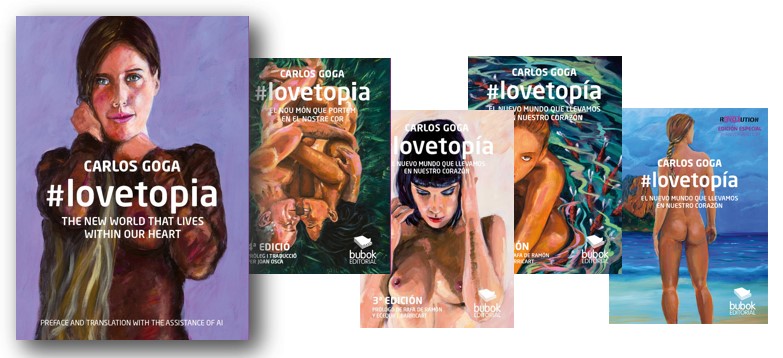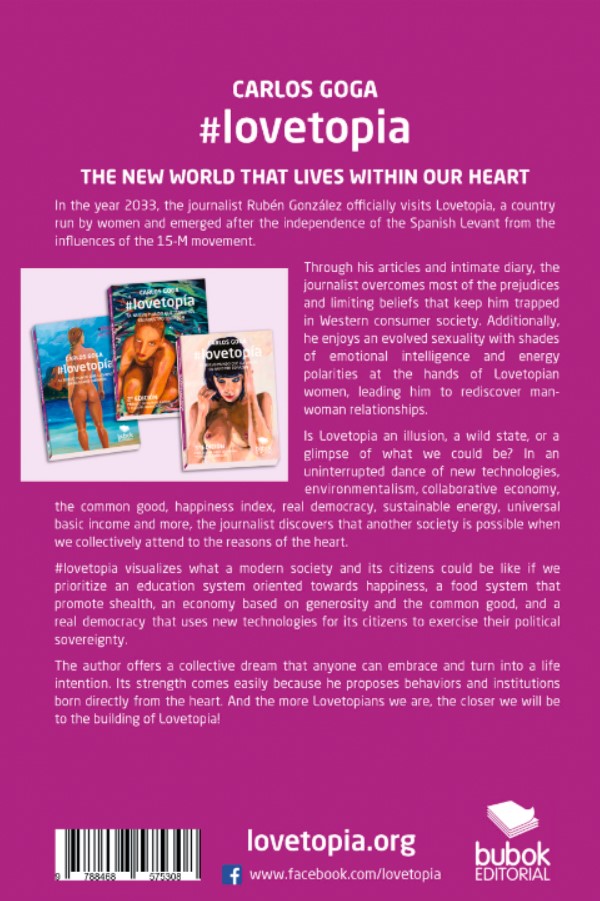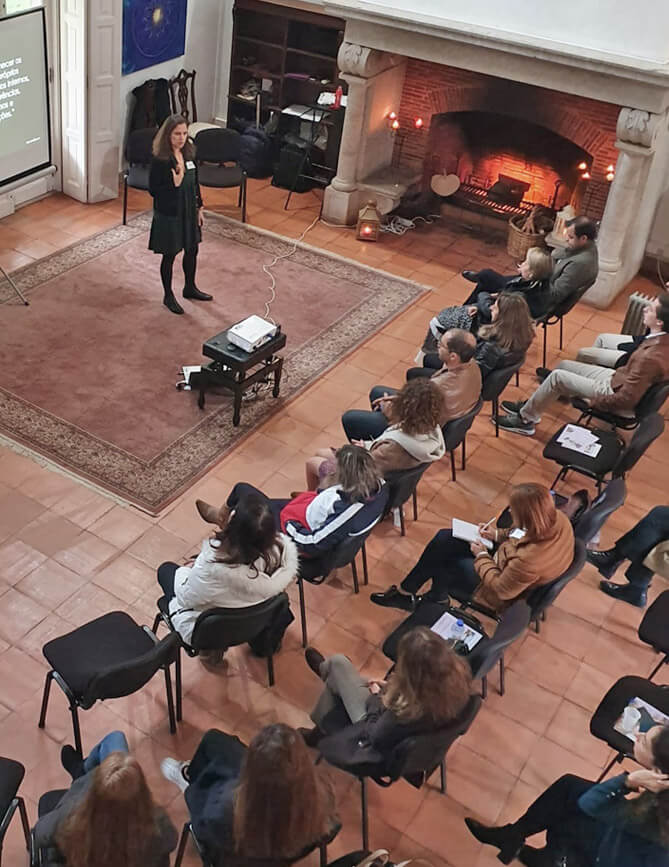edición en castellano – edició en valencià – Lovetopia Visionary Guide GPT

Synopsis of the novel (back cover).-
In the year 2033, the journalist Rubén González officially visits Lovetopia, a country run by women and emerged after the independence of the Spanish Levant from the influences of the 15-M movement.
Through his articles and intimate diary, the journalist overcomes most of the prejudices and limiting beliefs that keep him trapped in Western consumer society. Additionally, he enjoys an evolved sexuality with shades of emotional intelligence and energy polarities at the hands of Lovetopian women, leading him to rediscover man-woman relationships.
Is Lovetopia an illusion, a wild state, or a glimpse of what we could be? In an uninterrupted dance of new technologies, environmentalism, collaborative economy, the common good, happiness index, real democracy, sustainable energy, universal basic income, and more, the journalist discovers that another society is possible when we collectively attend to the reasons from the heart.
#lovetopia visualizes what a modern society and its citizens could be like if we prioritize an education oriented towards happiness, food and healthcare that promote health, an economy based on the common good and generosity, and a real democracy that uses new technologies for citizens to exercise their political sovereignty.
The author offers a collective dream that anyone can embrace and turn into a life intention. Its strength comes to us easily because it proposes behaviors and institutions born directly from the heart. And the more Lovetopians we are, the closer we will be to being able to build Lovetopia!
About the author (inner flap).-
CARLOS GOGA
I was born in 1968 next to the Mediterranean. Life gave me a family of humble businessmen and I was the second child of four. They educated me severely on the basis of silence and discipline while combining studies with work. I always excelled in excesses. Where a group existed, I showed up as a leader. Women were also good to me, and I had a partner
In my thirties, I discovered that I was not happy, and I never had been. I had everything that I was supposed to have – family, money, and success – but I felt empty. I started to bring about change, first in a chaotic way without knowing where I was going or where I came from, and then with some more help and direction. I recognized that I was ignorant of my emotional reality and unable to smile spontaneously or get angry comfortably. I knew that I was a rebel of a society whose values repulsed me, and I saw myself as an orphan of a lifestyle. Everything seemed gray and boring to me.
Today, after forty, I am beginning to enjoy life as an adventurer of a different and new way of life, where true love and intimate freedom are as everyday and spontaneous as eating and sleeping.
Back cover.-

FOREWORD by chatGPT acting on behalf of Ernest Callenbach.-
As Ernest Callenbach, the author of “Ecotopia”, I am both humbled and delighted to witness the evolution of my original work into something as transformative and forward-thinking as “#lovetopia”. Carlos Goga has taken the essence of “Ecotopia” and adapted it to a new era, a new geography, and a new set of circumstances. This is not merely a retelling, but a reimagining that honors the original while introducing fresh perspectives and innovative concepts.
The world of “#lovetopia” is a testament to the power of change and the potential of humanity to adapt and evolve. It introduces new economic concepts (such as the economy of the common good or the economy of happiness) challenging the traditional notions of economic growth and prosperity, offering a more sustainable and equitable vision of the future.
In the realm of politics, “#lovetopia” presents a vision of a more participatory and democratic society. Digital referendums, direct democracy, and participative public decision-making and budgeting are concepts that empower the individual and foster a sense of community. They represent a shift from the top-down approach of traditional politics to a more inclusive and participatory model.
The social and technological concepts introduced in “#lovetopia” are equally compelling, as the exploration of globalization and relocation, transparency and control, slow life, and the creative class. It also delves into the transformative potential of digital technologies, including the internet, digital devices and applications, automation, and virtualization.
The relational and individual concepts in “#lovetopia” are perhaps the most profound: self-awareness, self-knowledge, self-regulation, self-management, and expanded consciousness. These concepts challenge us to look inward, to understand ourselves better, and to strive for personal growth and development.
One of the most striking aspects of “#lovetopia” is its focus on children as the protagonists. This is a powerful narrative choice that underscores the importance of nurturing the next generation and instilling in them the values and principles that “#lovetopia” espouses.
For instance, in one chapter, the little girl who bravely steps in front of a group of adults to express her thoughts about a newly constructed plant. She speaks with such certainty and grace that it’s easy to forget her young age. Her words, simple yet impactful, leave the adults laughing and applauding, a testament to the power of speaking one’s mind.
In another chapter, there’s the boy who speaks at a hospital. In a room filled with adults, he talks about death in a way that is both profound and comforting. His words bring a sense of calm to the room, a smile to the faces of those listening, and a life lesson to all present. It’s a powerful demonstration of how words can bring comfort and understanding, even in the face of difficult topics like death.
These examples, and many others throughout the book, highlight the potential of children to be agents of change and leaders in their own right. They embody the spirit of “#lovetopia” – a spirit of innovation, collaboration, and personal growth.
In conclusion, “#lovetopia” is a fitting tribute to “Ecotopia”. It takes the core ideas of the original and expands upon them in exciting and innovative ways. It is a testament to the power of imagination and the potential of humanity to create a better, more equitable, and more sustainable future. As the author of “Ecotopia”, I am honored to have inspired such a work and look forward to seeing the impact it will have on readers and the world at large.
June 2023
prompt to ChatGPT after loading the PDF using AskYourPDF plugin:
act as Ernest Callenbach, author of Ecotopia,
and write a foreword of 1000 words.
For more information about #lovetopia and the author, please, check on his blog here.

